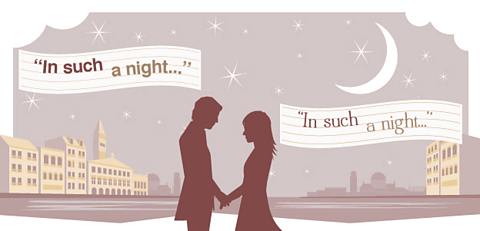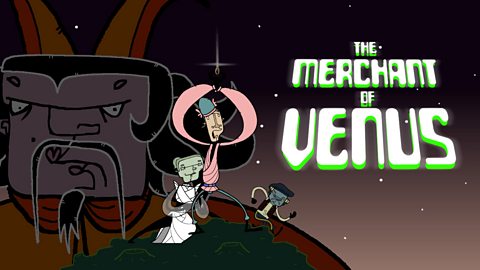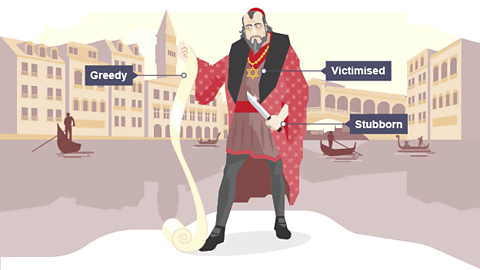Themes
There are many themes that run throughout the play, The Merchant of Venice. Explore the main themes of love, justice and money looking at how they affect characters and influence the story.
Key themes
There are several main themes that run through this play, often linking and overlapping with each other. The idea of cultural and religious intolerance is dealt with, as well as the status of women. The important themes in The Merchant of Venice are:
- money
- justice
- love
Money
Money and financial wealth are key to this play. The title itself refers to the merchant Antonio who trades in the Rialto. Each of the characters is connected in one way or another with money – either through a lack of it (Bassanio), a love of it (Shylock) or an excess of it (Portia). The question of worth and value is also raised. Shylock is upset about the loss of a turquoise ring that was given to him by his beloved Leah. It is the sentiment rather than the monetary loss that he is sad about. Later, when Balthazar/Portia asks Bassanio for his ring as a gift he replies that he would rather find the most expensive ring in Venice than give away his love token.
'The Merchant of Venice' theme - money
Money. Take a look at some now.
Paper money has the words ‘I promise’ on it.
What happens if you don’t keep a promise?
What if you promised to watch the toast?
And you didn’t.
What if you promised to feed the neighbour’s cat
while they were on holiday?
And you didn’t.
And pizza’s not good for cats. You’ll be in trouble.
You see, keeping promises is how money and business works.
Money’s just a symbol.
Shakespeare understood that money means different things
to different people.
Bassanio has no money, but wants to borrow more
to risk it on wooing Portia.
Money is precious to Shylock, but so is his honour
and need for revenge.
And Portia is extremely wealthy.
She’s inherited her money is happy to give it away.
But she keeps her promise to her dead father,
only marrying he that can open the right box.
She could be on her own banknote.
Shakespeare knew that you could tell a lot
about a person by how they are with money.
Introduce money into a plot and you find out
what people really value.
Analysis of money in the play
Question
How does money complicate Bassanio’s life?
Bassanio has no money. When he speaks with Antonio at the start of the play he tells us that he has been living beyond his means. He speaks of the debts he owes in both money and love to his friend Antonio.
BASSANIO
’Tis not unknown to you, Antonio,
How much I have disabled mine estate
Act 1 Scene 1
Question
To what extent is money precious to Shylock?
Very precious. Shylock seems to suggest that he would rather have his jewels and money returned to him than his daughter who stole them.
SHYLOCK
I would my daughter
were dead at my foot, and the jewels in her ear:
Act 3 Scene 1
Question
How does Portia show her wealth?
Portia is extremely wealthy. When Bassanio tells her about the debt, she immediately offers much more than the original loan. The ease with which she offers the money reveals her great financial wealth. It also shows her love for Bassanio as she is willing to give a huge sum of money away on his behalf.
PORTIA
Pay him six thousand, and deface the bond.
Double six thousand, and then treble that,
Before a friend of this description
Shall lose a hair through Bassanio's fault.
Act 3 Scene 2
Justice
In this play Shakespeare makes us think about the importance of fairness, justice and mercy. Antonio does not like the way Shylock makes his money because he thinks that charging excessive interest on loans is unjust. When Shylock agrees to lend 3000 ducats to Antonio he asks for a pound of flesh as his insurance. We might think that this is unjust as it places a financial value on human life. When Antonio’s ships sink, he is unable to repay his loan, and so by the strict laws of Venice he must stick to his contract. However when Bassanio offers to pay double the original loan, Shylock still insists on his pound of flesh. As an audience we are invited to think about whether it is always right and fair to stick to a contract or, in certain cases, mercy and flexibility are best.
'The Merchant of Venice' theme - justice
‘What is justice?’ Let’s ask ROBO-JUDGE 5000.
[ROBOT VOICE] "Justice!"
Yes, that’s right. Justice!
[ROBOT VOICE] "Justice!"
Ok. Here’s the first case. Accused of skipping the bus queue.
Well, ROBO-JUDGE 5000, What do you think?
[ROBOT VOICE] "Justice!"
I’m not a legal expert, but I think she’s entitled to appeal.
In The Merchant of Venice, Shakespeare asks us to think about justice,
punishment and mercy.
Shylock thinks that if he’s merciful, people will think
him foolish and weak.
But he’s confident that justice is on his side.
After all, Antonio agreed to the contract. There wasn’t any small print.
That looks like a shopping list, not a loan agreement.
And Antonio accepts that justice must be done,
even-- if he dies as a result.
But it’s the law itself that gets Shylock in the end.
Since Shylock shows no mercy,
Portia reveals herself to be merciless in the courtroom.
She asks him where his small print is!
Because blood isn’t mentioned, his contract is null and void.
You should always read the small print.
Even when it isn’t there. That’s why we have lawyers.
Shakespeare asks us ‘what is justice?’
Is it following the law no matter where it leads?
Or knowing when to cut someone a little slack?
Analysis of justice in the play
Question
How does Shakespeare use the theme of justice to demonstrate the marital situation Portia is in?
Portia is forced into a contract that her father has created. She is unable to choose who she wants as her husband because of her father’s will.
PORTIA
so is the will of a living daughter curbed by the will of a dead
father.
Act 1 Scene 2
She questions whether it is fair that a dead father should be able to rule his living daughter in this way.
Question
What is Shylock’s idea of justice?
Shylock seems to regard mercy as a weakness. He becomes obsessed with obtaining the pound of flesh Antonio has pledged as his bond. Shylock suggests that by showing mercy in this case he would be:
SHYLOCK
made a … fool
I'll not be made a soft and dull-eyed fool.
Act 3 Scene 3
This suggests that he has a very rigid idea of justice.
Question
How is Antonio affected by the theme of justice?
Antonio accepts that for justice to be done, Shylock must be entitled to his pound of flesh. The law of Venice governs traders from all around the world, so Antonio says that it must be followed to the letter.
ANTONIO
The Duke cannot deny the course of law;
Act 3 Scene 3
He accepts that he has signed a contract in good faith and therefore must be bound by it.
You may find similar themes in the following plays by Shakespeare:
The theme of justice and the law also appears in Romeo and Juliet. It is the Prince’s law that means Romeo is banished from the city after killing Tybalt – an act of mercy because the penalty is really death.
Love
This play deals with different types of love, often by comparing it to its opposite – hate. We see the love between friends with Portia and Nerissa and in particular with Antonio and Bassanio. Parental love is presented through Portia’s father and Launcelot and Old Gobbo. Then, of course there is the romantic love that we see in the relationships between Bassanio and Portia, Nerissa and Gratiano, and Jessica and Lorenzo. All of these can be contrasted with the hatred between Shylock and Antonio.
'The Merchant of Venice' theme - love
With all the talk of pounds of flesh, it’s easy to forget that
The Merchant of Venice is a play full of love.
That’s not to say that some people don’t love their meat.
And I’m sure some people can be quite affectionate
surrounded by mince.
Just don’t speak to him about 453 grams of flesh;
he’s very attached to Imperial measurements.
Doesn’t like metric one bit.
Have you got any more tattoos?
Antonio and Bassanio are very close friends.
Just think what Antonio is prepared to sacrifice!
Portia’s father also loved his daughter,
and devised a way to ensure she married the right person.
And despite Bassanio’s rather suspect courtship with Portia,
they really do end up loving one another.
It’s not about the money after all.
Hang on! This butcher has an awfully long arm.
We’re still on his arm aren’t we?
Thank goodness for that.
[WHISPERING] I never should have asked him to see his tattoos!
Analysis of love in the play
Question
How much does Antonio love Bassanio?
Antonio cares deeply for Bassanio. When Bassanio says he needs help, Antonio responds by saying he will do anything for his friend. He is happy to give up anything for love of his friend.
ANTONIO
My purse, my person, my extremest means
Lie all unlocked to your occasions.
Act 1 Scene 1
Question
How do the caskets represent a love challenge for Portia?
The caskets are a riddle that should be solved only by the man most suited to his daughter. This could be seen as her father’s way of protecting his precious daughter after he has died. Nerissa explains to Portia that her father had the best intentions by arranging how she should be married.
NERISSA
Your father was ever virtuous; and holy men at their death
have good inspirations.
Act 1 Scene 2
Did you know? In the time when the play is set, women were treated as property. They belonged to their fathers or brothers and later their husbands. Marriages were often arranged on their behalf.
Question
Shakespeare believes that people in love will overlook each other’s faults. What does this mean for Jessica and Lorenzo?
Jessica is prepared to dress as a male torchbearer to escape with Lorenzo, her beloved. She says that even though she looks like a boy, he will still love her.
JESSICA
But love is blind, and lovers cannot see.
Act 2 Scene 6
You may find similar themes in the following plays by Shakespeare:
- Romeo and Juliet – this tragedy is all about the love between two teenagers from warring families.
- A Midsummer Night’s Dream – in this comedy, a group of young Athenians find their true loves with a little help from some fairies.
- Much Ado About Nothing – there are lots of mix-ups and miscommunication in this comedy, but love rules in the end and everything turns out fine.
Activity
More on The Merchant of Venice
Find out more by working through a topic
- count5 of 5

- count1 of 5

- count2 of 5
